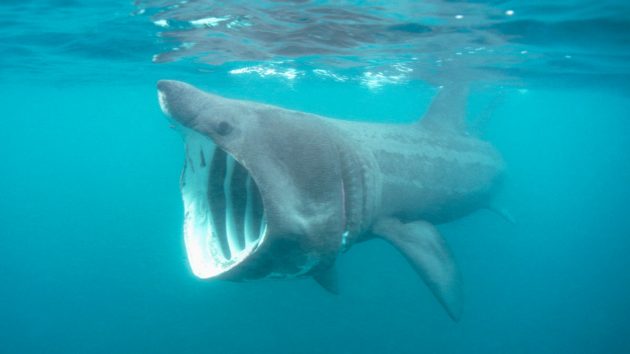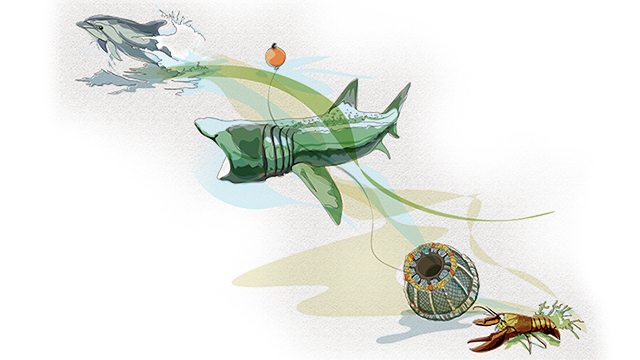The Shark Trust is asking for basking shark sightings to be reported to help understand more about the most heavily protected shark in UK and EU waters
Sailors and boaters around the UK coastline are being asked to report basking shark sightings to The Shark Trust.
These plankton feeders are already arriving in British waters and can be spotted from now until October.
Basking shark sightings are most common in the Hebrides (Skye and Mull), Isle of Man, Malin Head in Ireland, and Devon and Cornwall
All reports will be added to the trust’s Basking Shark Sightings Database which is used to study these endangered fish.
The basking shark population was driven almost to collapse due to intensive fishing from 1946-1995.

Basking sharks can be easily spotted due to their large, rounded triangular floppy dorsal fin
The fish were prized for their liver oil, meat, and large fins.
Today, they are at risk of being caught as bycatch or entangled in lost fishing gear.
Basking sharks are slow-growing, long-lived, late to mature, and produce few young and are listed as Endangered on the IUCN Red List of Threatened Species.
Continues below…
Boaters urged to watch marine wildlife responsibly
The Cornwall Marine and Coastal Code Group reminds boaters how to responsibly enjoy watching marine wildlife such as dolphins and…
Large spine found on Bournemouth beach could be from a shark
It’s not every day you come across what might be a shark’s spine. I love beach-combing for fossils and shark’s…
What should sailors do if they see marine wildlife in distress?
Following the discovery of a rare smalltooth sand tiger shark in the Solent, what should sailors do if they see…
UK seabirds: How to identify some of the most common breeds
Sailors have been watching seabirds for thousands of years. Early navigators in the Pacific used their knowledge of how far…
This makes them extremely vulnerable to human impacts. Once populations have declined, they can take a long time to recover which is why monitoring, management, and further research is vital to ensure their survival.
“While we need targeted and well-funded scientific research to fully understand the status and potential recovery of basking sharks, we can all play a part in filling the gaps,” says Paul Cox, Managing Director of the Shark Trust.
“Each sighting a from boat user, when added to our database, provides a piece of evidence that can help scientists draw conclusions. We’re really grateful to all our citizen scientists for the part they play in shark conservation and research.”

Basking sharks are plankton feeders. Credit: Getty
In UK waters it is illegal to intentionally harass or disturb basking sharks. If you encounter one, do not approach within 100m.
The Shark Trust has issued a Basking Shark Code of Conduct for water users, which is available here.
All basking shark sightings should be recorded either via The Shark Trust website or via The Shark Trust app.








